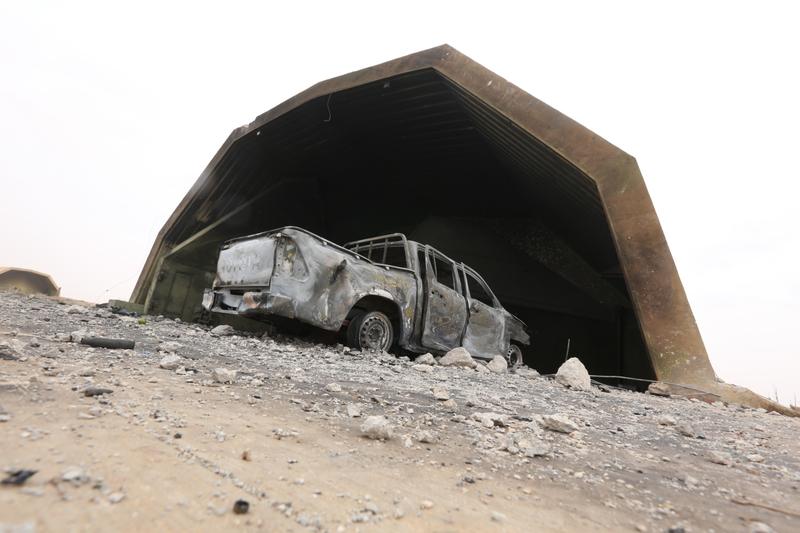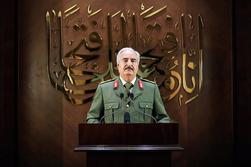 A view of Al-Watiya airbase occupied by warlord Khalifa Haftar's militias is seen after Libyan army retook it within 'Volcano of Rage' Operation in Tripoli, Libya on May 18, 2020. (HAZEM TURKIA / ANADOLU AGENCY VIA GETTY IMAGES / BLOOMBERG)
A view of Al-Watiya airbase occupied by warlord Khalifa Haftar's militias is seen after Libyan army retook it within 'Volcano of Rage' Operation in Tripoli, Libya on May 18, 2020. (HAZEM TURKIA / ANADOLU AGENCY VIA GETTY IMAGES / BLOOMBERG)
More than 1,000 Russian and Syrian mercenaries in Libya have pulled back from the front lines after a Turkish military intervention helped block an assault on the capital.
Western officials had said that more than 1,400 Russian mercenaries were deployed last year to assist Libya's Khalifa Haftar, who is also supported by the United Arab Emirates and Egypt
The intervention halted an attempt to capture Tripoli by the Moscow-backed strongman Khalifa Haftar.
The mercenaries with the Wagner company, headed by a confidant of Russian President Vladimir Putin, descended on the city of Bani Walid as they and Haftar’s self-styled Libyan National Army withdrew from Tripoli’s suburbs over the past few days, the city’s mayor Salem Alaywan said in a phone interview on Sunday.
Western officials had said that more than 1,400 Russian mercenaries were deployed last year to assist Haftar, who is also supported by the United Arab Emirates and Egypt. His aim is to dislodge the internationally recognized government in Tripoli, which in turn is backed by Turkey.
ALSO READ: Haftar’s forces announce air campaign against Turkey in Libya
Haftar had seemed poised to make inroads into Tripoli before Turkey escalated its military intervention in January, helping the government regain swathes of territory.
Alaywan said about 1,500 Russian and Syrian mercenaries had flown from Bani Walid to Haftar’s Juffra airbase in central Libya. The mayor said the mercenaries were still arriving but the city, which wants to remain neutral in the war and does not support their presence.
“We are opposed to any foreign mercenaries in Bani Walid or Libya,” he said.
 This image grab taken from a video published by the War Information Division of military strongman Khalifa Haftar's self-proclaimed Libyan National Army (LNA) on April 28, 2020 shows Haftar giving a speech, saying he had "a popular mandate" to govern the country, declaring a key 2015 political deal over and vowing to press his assault to seize Tripoli. (PHOTO / LNA WAR INFORMATION DIVISION / AFP)
This image grab taken from a video published by the War Information Division of military strongman Khalifa Haftar's self-proclaimed Libyan National Army (LNA) on April 28, 2020 shows Haftar giving a speech, saying he had "a popular mandate" to govern the country, declaring a key 2015 political deal over and vowing to press his assault to seize Tripoli. (PHOTO / LNA WAR INFORMATION DIVISION / AFP)
Call to arms
Both sides have relied heavily on mercenaries. In January, Turkey began sending thousands of Syrian militiamen to support the government in Tripoli, while Haftar is also supported by Syrian and Sudanese fighters.
The redeployment came as Haftar issued a renewed call to arms in an audio statement on Saturday, and days after his air force chief warned they would launch a campaign targeting Turkish assets in Libya.
The Tripoli-based government’s interior minister Fathi Bashagha told Bloomberg that Haftar had received a new fleet of Soviet-era jets from a Russian-controlled base in Syria.
The reason behind the mercenaries’ withdrawal was not immediately clear. The United Nations acting envoy to Libya Stephanie Williams had warned last week that the yearlong conflict could further escalate as both sides’ foreign backers double down on military support.
READ MORE: Eastern Libyan forces say to move back from Tripoli fronts
But a renewed arms race could also prompt Turkey and Russia to step back from the brink and pressure their local clients to sign a cease-fire. In January, Moscow had hosted a meeting where the Tripoli-based government agreed a cease-fire, but Haftar refused.
Turkey and Russia have again announced their support for ending the fighting that has killed more than 2,000 people, a call backed by US President Donald Trump. He spoke with Turkish President Recep Tayyip Erdogan by phone on Saturday, according to the White House.


